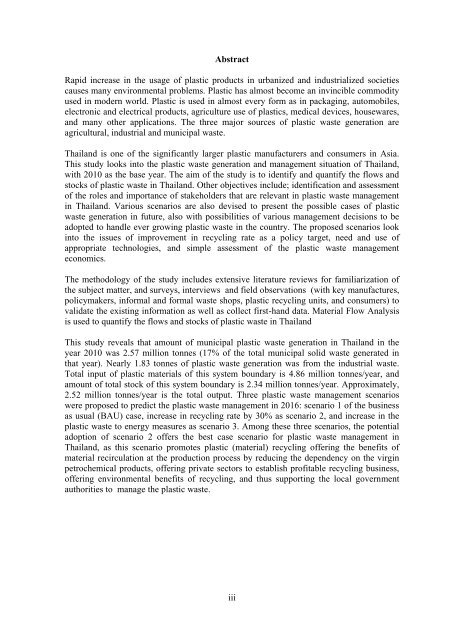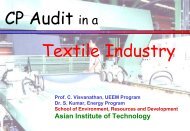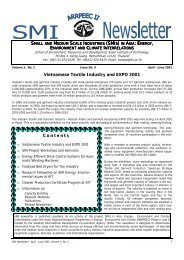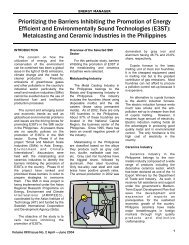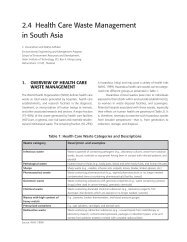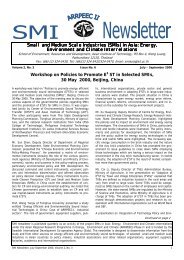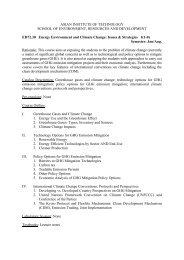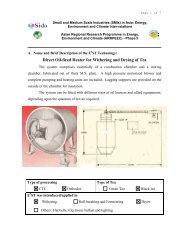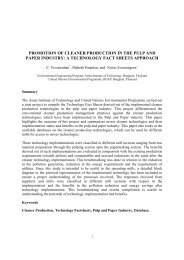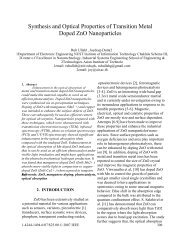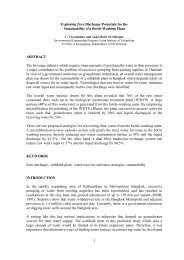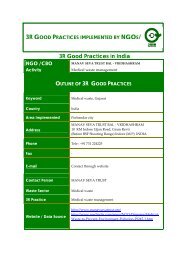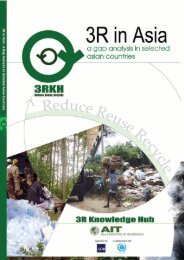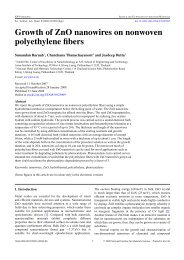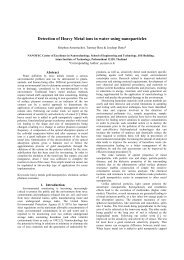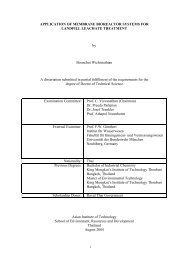Evaluation of Plastic Waste Management in Thailand Using Material ...
Evaluation of Plastic Waste Management in Thailand Using Material ...
Evaluation of Plastic Waste Management in Thailand Using Material ...
Create successful ePaper yourself
Turn your PDF publications into a flip-book with our unique Google optimized e-Paper software.
Abstract<br />
Rapid <strong>in</strong>crease <strong>in</strong> the usage <strong>of</strong> plastic products <strong>in</strong> urbanized and <strong>in</strong>dustrialized societies<br />
causes many environmental problems. <strong>Plastic</strong> has almost become an <strong>in</strong>v<strong>in</strong>cible commodity<br />
used <strong>in</strong> modern world. <strong>Plastic</strong> is used <strong>in</strong> almost every form as <strong>in</strong> packag<strong>in</strong>g, automobiles,<br />
electronic and electrical products, agriculture use <strong>of</strong> plastics, medical devices, housewares,<br />
and many other applications. The three major sources <strong>of</strong> plastic waste generation are<br />
agricultural, <strong>in</strong>dustrial and municipal waste.<br />
<strong>Thailand</strong> is one <strong>of</strong> the significantly larger plastic manufacturers and consumers <strong>in</strong> Asia.<br />
This study looks <strong>in</strong>to the plastic waste generation and management situation <strong>of</strong> <strong>Thailand</strong>,<br />
with 2010 as the base year. The aim <strong>of</strong> the study is to identify and quantify the flows and<br />
stocks <strong>of</strong> plastic waste <strong>in</strong> <strong>Thailand</strong>. Other objectives <strong>in</strong>clude; identification and assessment<br />
<strong>of</strong> the roles and importance <strong>of</strong> stakeholders that are relevant <strong>in</strong> plastic waste management<br />
<strong>in</strong> <strong>Thailand</strong>. Various scenarios are also devised to present the possible cases <strong>of</strong> plastic<br />
waste generation <strong>in</strong> future, also with possibilities <strong>of</strong> various management decisions to be<br />
adopted to handle ever grow<strong>in</strong>g plastic waste <strong>in</strong> the country. The proposed scenarios look<br />
<strong>in</strong>to the issues <strong>of</strong> improvement <strong>in</strong> recycl<strong>in</strong>g rate as a policy target, need and use <strong>of</strong><br />
appropriate technologies, and simple assessment <strong>of</strong> the plastic waste management<br />
economics.<br />
The methodology <strong>of</strong> the study <strong>in</strong>cludes extensive literature reviews for familiarization <strong>of</strong><br />
the subject matter, and surveys, <strong>in</strong>terviews and field observations (with key manufactures,<br />
policymakers, <strong>in</strong>formal and formal waste shops, plastic recycl<strong>in</strong>g units, and consumers) to<br />
validate the exist<strong>in</strong>g <strong>in</strong>formation as well as collect first-hand data. <strong>Material</strong> Flow Analysis<br />
is used to quantify the flows and stocks <strong>of</strong> plastic waste <strong>in</strong> <strong>Thailand</strong><br />
This study reveals that amount <strong>of</strong> municipal plastic waste generation <strong>in</strong> <strong>Thailand</strong> <strong>in</strong> the<br />
year 2010 was 2.57 million tonnes (17% <strong>of</strong> the total municipal solid waste generated <strong>in</strong><br />
that year). Nearly 1.83 tonnes <strong>of</strong> plastic waste generation was from the <strong>in</strong>dustrial waste.<br />
Total <strong>in</strong>put <strong>of</strong> plastic materials <strong>of</strong> this system boundary is 4.86 million tonnes/year, and<br />
amount <strong>of</strong> total stock <strong>of</strong> this system boundary is 2.34 million tonnes/year. Approximately,<br />
2.52 million tonnes/year is the total output. Three plastic waste management scenarios<br />
were proposed to predict the plastic waste management <strong>in</strong> 2016: scenario 1 <strong>of</strong> the bus<strong>in</strong>ess<br />
as usual (BAU) case, <strong>in</strong>crease <strong>in</strong> recycl<strong>in</strong>g rate by 30% as scenario 2, and <strong>in</strong>crease <strong>in</strong> the<br />
plastic waste to energy measures as scenario 3. Among these three scenarios, the potential<br />
adoption <strong>of</strong> scenario 2 <strong>of</strong>fers the best case scenario for plastic waste management <strong>in</strong><br />
<strong>Thailand</strong>, as this scenario promotes plastic (material) recycl<strong>in</strong>g <strong>of</strong>fer<strong>in</strong>g the benefits <strong>of</strong><br />
material recirculation at the production process by reduc<strong>in</strong>g the dependency on the virg<strong>in</strong><br />
petrochemical products, <strong>of</strong>fer<strong>in</strong>g private sectors to establish pr<strong>of</strong>itable recycl<strong>in</strong>g bus<strong>in</strong>ess,<br />
<strong>of</strong>fer<strong>in</strong>g environmental benefits <strong>of</strong> recycl<strong>in</strong>g, and thus support<strong>in</strong>g the local government<br />
authorities to manage the plastic waste.<br />
iii


